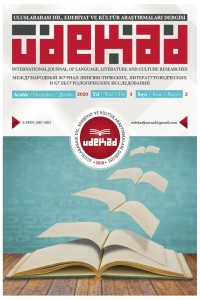PLATONİK FORMLAR VE YABANCILAŞMA: THOMAS MANN’IN BÜYÜLÜ DAĞ’INA ANALİTİK BAKIŞ - PLATONIC FORMS AND ALIENATION: AN ANALYSIS FROM THE MAGIC MOUNTAIN BY THOMAS MANN
Abstract
Bu çalışma Platon’un form/idea kavramına ve bunun Feuerbachçı eleştiri üzerinden yabancılaştırıcı imkânına bakmaktadır. Söz konusu inceleme ve eleştiri Thomas Mann'ın Büyülü Dağ adlı eserindeki “Vaftiz Çanağı - İki Biçimiyle Büyükbaba” isimli bölüm bağlamında yapılmaktadır. Bu bölümün odaklandığı konu, romanın kahramanı Hans Castorp’a ait, büyükbabası Hans Lorenz Castorp’un gerçek fiziksel boyutuyla resmedildiği bir portredir. Hamburg’un önemli simalarından biri olan senatör Hans Lorenz, çocukluğunda yetim ve öksüz kalan Hans Castorp’un büyütülmesinde kritik bir rol oynamış, ancak kısa bir süre sonra ölmüştür. Portrenin kendisi Platon’un formlarını andırmaktadır. Romanda, Castorp için büyükbabasının "saf ve hakiki biçim"i olarak betimlenen portre, "gündelik" büyükbabayla kıyaslandığında onun kusursuz bir formu gibidir. Platon’a göre, her şeyin ideal biçimi onun hakiki formu olup, realist bir materyalist için gerçekliğin aslı olan maddi nesneler de, bu formların yalnızca zayıf birer kopyasıdırlar. Böyle bir materyalist bakış açısının zıddı olarak, Platon’un kusursuz formlar öğretisinde nihai gerçeklik, algılanan maddi dünyanın dışında/ötesinde bir alana konumlanmaktadır. Bu çalışmada, materyalist Feuerbach’ın eleştirel yaklaşımı üzerinden Platoncu öğretinin ters çevrilmesiyle, bahsi geçen portrenin potansiyel olarak yabancılaştırıcı gücü olduğu gösterilmektedir. Büyülü Dağ’daki portre, gerçek büyükbabasının hafızasındaki anlamını yitirtmesi ve ona yabancılaştırması bakımından Castorp’ta da benzer bir etkiye sahiptir.
Abstract
This paper examines the concept of the Platonic form and through a critique of Ludwig Feuerbach demonstrate its alienating potential. This examination and critique is made within the context of a section called “of The Christening Basin, and of Grandfather in His Two-fold Guise” of the novel The Magic Mountain by Thomas Mann. The focus of that section is on a life-size portrait belonging to the protagonist of the novel, Hans Castorp. The portrait is of his paternal grandfather, Hans Lorenz Castorp, a principal citizen of Hamburg who had played a key role in the orphaned upbringing of Castorp until his own death. The portrait itself is analogous to a Platonic form. It is described in the novel as being for Castorp the “pure and genuine form” of his grandfather contrasted with which “the everyday” grandfather is “merely subsidiary.” For Plato, the ideal form of anything is its real type whereas what to a direct realist materialist would be a real object is merely for Plato a poor copy of it. Being the inversion of such a materialist perspective, the doctrine of Plato of ideal forms places ultimate reality outside of sense perception and the material world. By using the critique of the materialist Feuerbach, however, it can be shown that the Platonic doctrine is potentially alienating in its inversion. The portrait in The Magic Mountain has a similar affect on Castorp in that it displaces the significance of his actual grandfather in his memory and as such effectively alienates him in his remembrance of him.
Keywords
Platon Formlar Feuerbach Yabancılaşma Genç Hegelciler Thomas Mann Iris Murdoch Young Hegelians
References
- Freifeld, A., Bergmann, P. & Rosenthal, B. G. (1998). “East Europe Reads Nietzsche”, East European Monographs. New York: Columbia.
- Feuerbach, Ludwig (2008). Hıristiyanlığın Özü. İstanbul: Say Yayınları.
- Feuerbach, Ludwig. Provisional Theses for the Reformation of Philosophy. Erişim websitesi: http://users.sussex.ac.uk/~sefd0/tx/pt.htm. [Erişim Tarihi: 14.07.2019]
- Huemer, Michael (2016). Approaching Infinity. Hampshire: Palgrave Macmillan.
- Mann, Thomas (2011). Büyülü Dağ. İstanbul: Can Yayınları
- Melling, David J. (1990). Understanding Plato. Oxford: Oxford University.
- Murdoch, Iris (2015). İyinin Egemenliği. İstanbul: Ayrıntı Yayınları.
- Platon (2012). Phaidon. İstanbul: Kabalcı Yayınları.
- Platon (2016). Devlet. İstanbul: Türkiye İş Bankası Yayınları.
- Singer, Peter (1992). “Marx”, Great Political Thinkers (Ed) Keith Thomas. Oxford: Oxford University.
- Van Abbe, Derek (1953). “Germany—Bismarck or Beethoven?” The Australian Quarterly. Vol. 25. No. 3. Australian Institute of Political Science.
- Widdows, Heather (2005). The Moral Vision of Iris Murdoch. Hampshire: Ashgate.
Abstract
References
- Freifeld, A., Bergmann, P. & Rosenthal, B. G. (1998). “East Europe Reads Nietzsche”, East European Monographs. New York: Columbia.
- Feuerbach, Ludwig (2008). Hıristiyanlığın Özü. İstanbul: Say Yayınları.
- Feuerbach, Ludwig. Provisional Theses for the Reformation of Philosophy. Erişim websitesi: http://users.sussex.ac.uk/~sefd0/tx/pt.htm. [Erişim Tarihi: 14.07.2019]
- Huemer, Michael (2016). Approaching Infinity. Hampshire: Palgrave Macmillan.
- Mann, Thomas (2011). Büyülü Dağ. İstanbul: Can Yayınları
- Melling, David J. (1990). Understanding Plato. Oxford: Oxford University.
- Murdoch, Iris (2015). İyinin Egemenliği. İstanbul: Ayrıntı Yayınları.
- Platon (2012). Phaidon. İstanbul: Kabalcı Yayınları.
- Platon (2016). Devlet. İstanbul: Türkiye İş Bankası Yayınları.
- Singer, Peter (1992). “Marx”, Great Political Thinkers (Ed) Keith Thomas. Oxford: Oxford University.
- Van Abbe, Derek (1953). “Germany—Bismarck or Beethoven?” The Australian Quarterly. Vol. 25. No. 3. Australian Institute of Political Science.
- Widdows, Heather (2005). The Moral Vision of Iris Murdoch. Hampshire: Ashgate.
Details
| Primary Language | Turkish |
|---|---|
| Journal Section | Research Articles |
| Authors | |
| Publication Date | December 31, 2020 |
| Submission Date | September 15, 2020 |
| Acceptance Date | December 20, 2020 |
| Published in Issue | Year 2020 Volume: 3 Issue: 2 |
* It is important for our referees to enter their fields of expertise in detail in terms of assigning referees in the process.
* The articles sent to our journal can only be withdrawn by giving reasons during the preliminary evaluation process. It is not possible to withdraw the articles that have started the evaluation process. Thank you for your understanding and we wish you good work.


